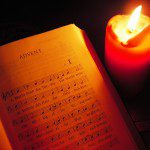 A few years back, at a Gay Pride Event in Lancaster, Pennsylvania, I ironically stated to a protester, “May God forgive you for what you’re doing.” Rather quick on his feet, he responded, “We worship different gods.” As I walked away, I wondered if, in his own way, he had stated a theological dilemma that touches not only the relationships of Christians with one another, but persons of other religious traditions as well. We may use the same language, but understand the meaning of our words – such as God, salvation, revelation – in very different ways. Moreover, given the immensity of the universe and our own personal finitude and temptation to shape the world according to our images and self-interest, the idea that we can “know” God fully in any doctrinal sense is an illusion bounding on idolatry, making the infinite conform to our parochial and by definition limited images.
A few years back, at a Gay Pride Event in Lancaster, Pennsylvania, I ironically stated to a protester, “May God forgive you for what you’re doing.” Rather quick on his feet, he responded, “We worship different gods.” As I walked away, I wondered if, in his own way, he had stated a theological dilemma that touches not only the relationships of Christians with one another, but persons of other religious traditions as well. We may use the same language, but understand the meaning of our words – such as God, salvation, revelation – in very different ways. Moreover, given the immensity of the universe and our own personal finitude and temptation to shape the world according to our images and self-interest, the idea that we can “know” God fully in any doctrinal sense is an illusion bounding on idolatry, making the infinite conform to our parochial and by definition limited images.
There is a Buddhist saying, “Don’t confuse the moon with the finger pointing to the moon.” The Christian tradition, following the wisdom of its Hebraic elder sibling, contrasts the kataphatic and apophatic approaches to experiencing and describing God. The kataphatic way focuses on God’s presence, the immanence of God in our world and allows us to experience God in all things and all things in God. This is the Eucharistic or sacramental vision of the universe: all things are holy and iconic, because God’s presence undergirds and moves through all things, as the reality in whom we live and move and have our being. The danger of the kataphatic way is that we localize the divine in particular places, persons, revelations, or sacred texts, and thus fight over doctrines and proprieties whose foundations are beyond our comprehension. Ironically, adherents of the kataphatic way, whose beliefs depend on affirming God’s presence in the world, often deny God’s presence in the lives and wisdom of other persons of faith. Universal revelation is transformed into special and exclusive revelation and the theological wars begin.
The apophatic way serves as a type of theological Lysol, reminding persons of faith that the ultimate is always more than we can conceive. No one has seen God and lived, proclaims Jewish wisdom. No word, image, experience, or holy book can fully contain the divine wisdom and energy. Our affirmations always need a dose of humility in order to keep us open to new truths and the truths present in our neighbor’s faith traditions.
Based on this preamble, one of the dangers of religious faith is assuming that we fully know the truth and that our truths are superior to those of our religious neighbors. From the point of view of family systems theory, the process of differentiation has been the source of piety and creativity but also intolerance and violence among the Abrahamic faiths. Historically, each has been supercessionist in attitude by believing itself the fulfillment of its neighbor’s faith. The Hebraic people affirmed the superiority of their monotheistic faith over the earth-based faiths of Canaan. With the revelation of God in Christ, followers of Jesus saw their savior as the Messiah and fulfillment of the Jewish tradition. Islam, the final movement of the stream of Abrahamic faiths, affirmed that each people received a revelation of God, but also assumed that Allah’s revelation to Mohammed had directness and purity that the other traditions lacked. In return, many Jewish theologians spoke of Christianity and Islam as merely Judaism for the wider world, with nothing truly novel to share, and conservative Christians fixated on New Testament passages asserting that the only path to salvation comes through a personal relationship with Jesus and the affirmation of scriptural infallibility. Not to be outdone, many Muslims proclaim the inerrancy of Allah’s revelation in the Qur’an and hesitate to translate their holy text into languages other than Arabic.
This, of course, is just the tip of the iceberg; I have not discussed controversies over polytheism, the trinity, and the divinity of Jesus, not to mention crusade, genocide, and terrorism.
Do we worship the same God and, anyway, is it important? The notion of direct revelation, unmediated by time, place, and fallibility, may be one of the problems in the relations among religions and within each religion. The peoples of the book proclaim a historic faith, in which God is at work in the rough and tumble realities of history. They tell of persons who lived and died in particular times and places and faced unique historical and spiritual challenges. They recognize the limitations of even the greatest of prophets. But, when it comes to holy books, there is a tendency to exempt both the revelation and the writing from the unique limitations and possibilities of history and personality. As one writer quipped about the fundamentalist tendencies of the descendants of the Protestant Reformers: they substituted paper infallibility for papal infallibility!
Humility demands that I make this confession: I could be wrong in what follows. To do otherwise would be to claim infallibility for my solution that is unavailable to human seekers, regardless of their spiritual stature. I believe that each of Abrahamic traditions, including my own, needs to forsake the idolatry of having the sole or highest possession of truth. They need to separate their image of one God from the belief in one truth. If the divine one is infinite and we are finite, then any images and words – including those we describe as revelation – partake in our limitations; they may show us an aspect of God or reveal God’s vision for our lives or a particular historical context, but they cannot give us the God’s eye view of all times, places, and people. The Islamic insight that every people have received a revelation points to the necessity that we view the divine in different ways. Moreover, and this is most perplexing to fundamentalists of all faiths, if God is alive and not an inert object, then God’s revelations and approaches to humankind will be constantly changing, even if God’s intent is always the same. What is best for one person may not be best for another, what fits into one cultural context, may be inappropriate for another and, perhaps, the living God takes this into account, revealing to each culture and person what it needs at this point of time. Allah-God-Brahmin speaks in Arabic, but equally so in Hindi, English, Chinese, Cherokee, and aboriginal tongues.
Diversity in faiths, pluralism, and polydoxy are inherent in the religious journey. The seeker need not despair of relativism. In fact, he or she may overwhelmed by the abundance of divine revelations and the wisdom in differently nuanced traditions. While we will never fully grasp the moon, we will rejoice in the many phases of the moon, enlightening our lives and guiding the pathways of pilgrims.
This post is part of a roundtable response to the new book, Do Jews, Christian & Muslims Worship the Same God? now featured at the Patheos Book Club.













